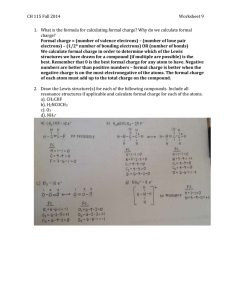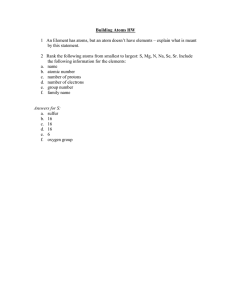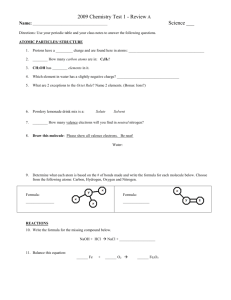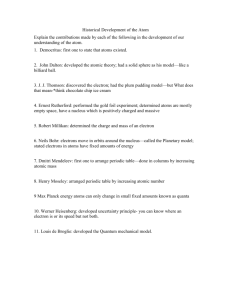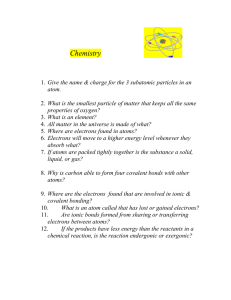Chemical Bonds
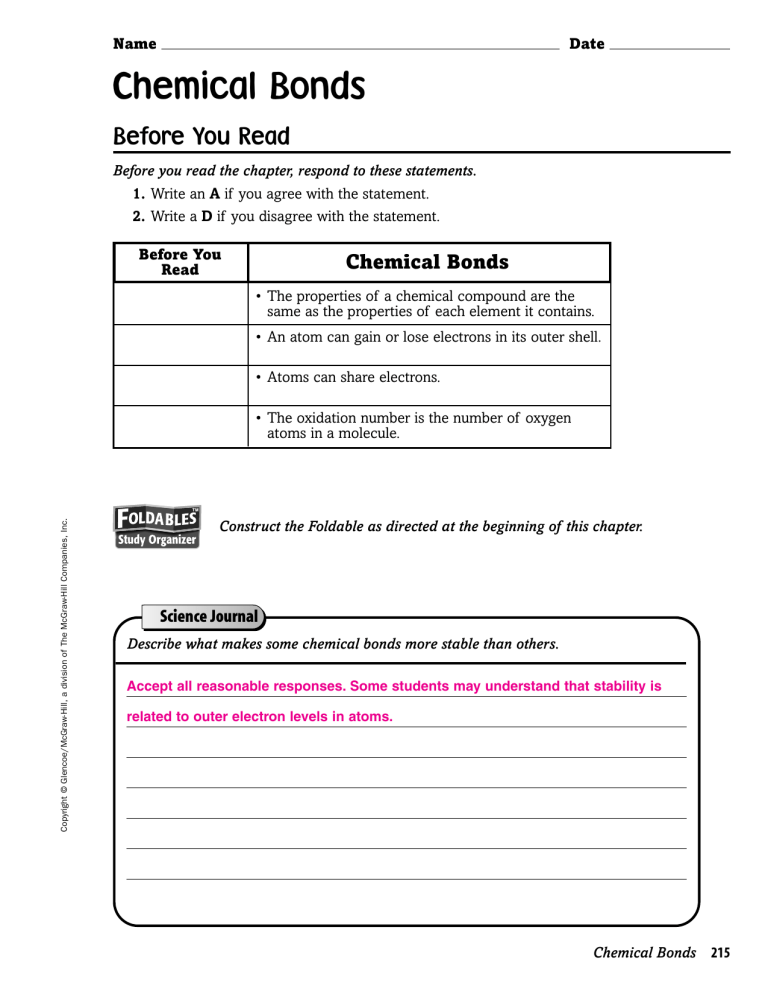
215_226_CH18_SN_896279 3/29/10 10:50 PM Page 215 User-040 113:GO00503:GPS_Science_Notebook_TE_12%0:XXXXXXXXXXXXX_SE:Application_Files
Name Date
Chemical Bonds
Before You Read
Before you read the chapter, respond to these statements.
1. Write an A if you agree with the statement.
2. Write a D if you disagree with the statement.
Before You
Read
Chemical Bonds
• The properties of a chemical compound are the same as the properties of each element it contains.
• An atom can gain or lose electrons in its outer shell.
• Atoms can share electrons.
• The oxidation number is the number of oxygen atoms in a molecule.
Construct the Foldable as directed at the beginning of this chapter.
Science Journal
Describe what makes some chemical bonds more stable than others.
Accept all reasonable responses. Some students may understand that stability is related to outer electron levels in atoms.
Chemical Bonds 215
P rinter P DF
215_226_CH18_SN_896279 3/29/10 10:50 PM Page 216 User-040 113:GO00503:GPS_Science_Notebook_TE_12%0:XXXXXXXXXXXXX_SE:Application_Files
Name Date
Chemical Bonds
Section 1 Stability in Bonding
Predict four topics that might be discussed after reviewing the objectives of Section 1.
Accept all reasonable responses.
1.
how a compound differs from the elements it contains
2.
the significance of a chemical formula
3.
the role of opposing electrical forces in compounds
4.
causes for chemical bonding
Review
Vocabulary
compound
Define compound . Use your book for help.
substance formed from two or more elements in which the exact combination and proportion of elements is always the same
New
Vocabulary
chemical formula
Define the following vocabulary terms. Use your book for help.
a formula that tells what elements and how many atoms of each element are in a compound chemical bond the force that holds atoms together in a compound
Academic
Vocabulary
unique
Define unique . Use a dictionary for help. Then use the word in a sentence that demonstrates its scientific meaning.
being the only one; being without a like or equal
Accept all reasonable responses.
216 Chemical Bonds
P rinter P DF
215_226_CH18_SN_896279 3/29/10 10:50 PM Page 217 User-040 113:GO00503:GPS_Science_Notebook_TE_12%0:XXXXXXXXXXXXX_SE:Application_Files
Name Date
Section 1 Stability in Bonding
(continued)
Combined
Elements
I found this information on page .
SE, p. 552
RE, p. 312
Formulas
I found this information on page .
SE, p. 553
RE, p. 313
Evaluate why sodium chloride is not like the elements that form it.
Accept all reasonable responses. The elements that combine to form sodium chloride are sodium and chlorine. Sodium is a shiny, soft, silvery metal that reacts violently with water. Chlorine is a greenish-yellow, poisonous gas. The compound is table salt.
Complete the graphic organizer. Use the table in your book for information.
Silicon dioxide contains one atom of silicon of oxygen
.
Chemical Bond
Formation
I found this information on page .
SE, pp. 554–556
RE, p. 314
Summarize what can be learned about an element from its electron dot diagram. Then draw an electron dot diagram of lithium below your answer. Use the examples of electron dot diagrams shown in your book for help.
An electron dot diagram shows the electrons in the outer energy level of an atom.
Drawings should give the chemical symbol for lithium, Li, with one dot above the symbol. Students may also draw the inner orbit with two electrons. Explain that dot diagrams should include only the outer electrons.
Chemical Bonds 217
P rinter P DF
215_226_CH18_SN_896279 3/29/10 10:50 PM Page 218 User-040 113:GO00503:GPS_Science_Notebook_TE_12%0:XXXXXXXXXXXXX_SE:Application_Files
Name Date
Section 1 Stability in Bonding
(continued)
Chemical Bond
Formation
I found this information on page .
SE, pp. 554–556
RE, pp. 314–316
Create your own electron dot diagrams for sodium and chlorine.
Explain how both atoms could become more stable.
Sketches should show one dot above the chemical symbol for sodium (Na).
Sketches should show seven dots around the chemical symbol for
Chlorine (Cl).
Chlorine needs one more electron to fill its outer level and make it stable. If sodium gives up its one outer electron, the next lower level becomes the outer level and, since it is full, the atom becomes stable.
Complete the statements about chemical bonds.
When atoms gain
, lose
, or share electrons, an attraction forms between the them together to form a compound atoms
, pulling
. The attraction is called a chemical bond
. A chemical bond is the holds atoms together in a compound
.
force that
C
ONNECT
I
T
Make an analogy between the sharing of electrons and the completion of a jigsaw puzzle.
Accept all reasonable responses. Atoms may share, gain, or lose electrons in order to complete their outer energy levels. This is similar to a jigsaw puzzle in that the pieces fit together like sharing, gaining, or losing electrons.
218 Chemical Bonds
P rinter P DF
